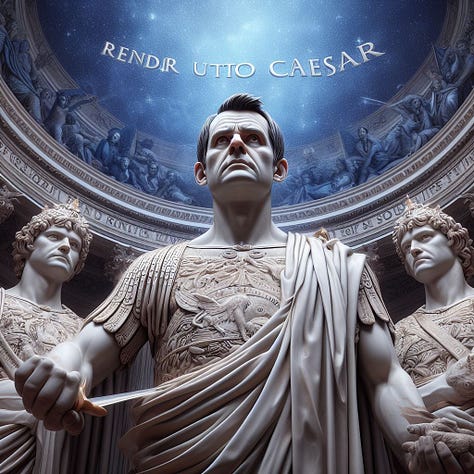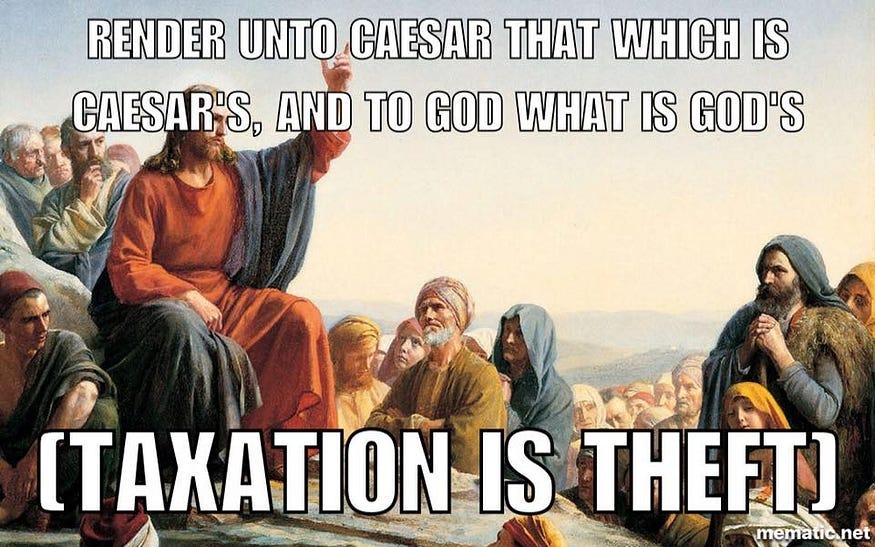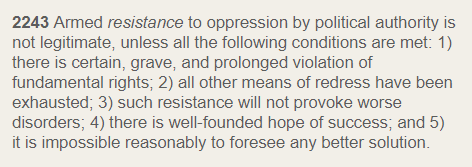Today’s Gospel is kind of… debatable? Search “Render unto Caesar meme,” and you’ll get both of these1—
And just because I found out Substack has an AI image generator,2 I prompted it with “render unto Caesar”:
So what does it mean? Let’s find out.
Reading 1
Is 45:1, 4-6
Thus says the LORD to his anointed, Cyrus, whose right hand I grasp, subduing nations before him, and making kings run in his service, opening doors before him and leaving the gates unbarred: For the sake of Jacob, my servant, of Israel, my chosen one, I have called you by your name, giving you a title, though you knew me not. I am the LORD and there is no other, there is no God besides me. It is I who arm you, though you know me not, so that toward the rising and the setting of the sun people may know that there is none besides me. I am the LORD, there is no other.
In this passage, Isaiah prophesies the coming of Cyrus the Great to free Israel from Babylon.3 But that wasn’t Cyrus’ goal; he was just conquering everybody. He doesn’t know that he, as the Persian emperor, is part of God’s plan.
But even some who called himself “King of the Four Corners of the World” is subject to God, whether he knows it or not.
Responsorial Psalm
Ps 96:1, 3, 4-5, 7-8, 9-10
R. Give the Lord glory and honor.
Sing to the LORD a new song;
sing to the LORD, all you lands.
Tell his glory among the nations;
among all peoples, his wondrous deeds.
R. Give the Lord glory and honor.
For great is the LORD and highly to be praised;
awesome is he, beyond all gods.
For all the gods of the nations are things of nought,
but the LORD made the heavens.
R. Give the Lord glory and honor.
Give to the LORD, you families of nations,
give to the LORD glory and praise;
give to the LORD the glory due his name!
Bring gifts, and enter his courts.
R. Give the Lord glory and honor.
Worship the LORD, in holy attire;
tremble before him, all the earth;
say among the nations: The LORD is king,
he governs the peoples with equity.
R. Give the Lord glory and honor.
Kingdoms come and go, nations fall, but God made everything.
We can’t possibly pay God back for everything he’s done, but we do owe him worship. That need is what the Church identifies as the religious impulse.
Reading 2
1 Thes 1:1-5b
Paul, Silvanus, and Timothy to the church of the Thessalonians in God the Father and the Lord Jesus Christ: grace to you and peace. We give thanks to God always for all of you, remembering you in our prayers, unceasingly calling to mind your work of faith and labor of love and endurance in hope of our Lord Jesus Christ, before our God and Father, knowing, brothers and sisters loved by God, how you were chosen. For our gospel did not come to you in word alone, but also in power and in the Holy Spirit and with much conviction.
Paul switches up the usual order of the theological virtues—faith, love, and hope. The order emphasizes the hope in the second coming. It’s right to thank God for granting these virtues to our friends.
Alleluia
Phil 2:15d, 16a
R. Alleluia, alleluia.
Shine like lights in the world
as you hold on to the word of life.
R. Alleluia, alleluia.
Sharing the Gospel through words and deeds is how other people, whether friends or King Cyrus the Great, will find out about God.
Gospel
Mt 22:15-21
The Pharisees went off and plotted how they might entrap Jesus in speech. They sent their disciples to him, with the Herodians, saying, "Teacher, we know that you are a truthful man and that you teach the way of God in accordance with the truth. And you are not concerned with anyone's opinion, for you do not regard a person's status. Tell us, then, what is your opinion: Is it lawful to pay the census tax to Caesar or not?"
Knowing their malice, Jesus said, "Why are you testing me, you hypocrites? Show me the coin that pays the census tax." Then they handed him the Roman coin. He said to them, "Whose image is this and whose inscription?"
They replied, "Caesar's."
At that he said to them, "Then repay to Caesar what belongs to Caesar and to God what belongs to God."
Of the many interpretations of “render unto Caesar’s,” one we can absolutely rule out is “pay your taxes.” Why? Because that was the question. If Jesus just wanted us to pay our taxes, you would’ve just said, “Yup, it’s lawful.”
The thing is, the Pharisees asked a trick question, trying to back him into a corner—pay the taxes, and anger the radical free-Israelites? Or don’t pay taxes, and be branded a rebel against the empire?
Jesus doesn’t pick from their false choices; instead, he gives them a trick answer. He asks for a coin, and the Pharisee has one in his pocket! He’s not using an Israelite coin. He, and the other Pharisees, have already accepted the emperor’s medium of exchange, as well as his protection.
They owe Caesar taxes because they’ve accepted his government. If his government is unlawful (against God’s law), they shouldn’t be obeying him at all, much less paying taxes. As the Catechism says—
God, as we heard in the Psalm, created everything. We owe Him everything. The king, the emperor, the president, whoever—they’re all subordinate to God.
So we pay our taxes if we owe taxes, but we give God His due no matter what.
Bing came up with these, even crazier images:












